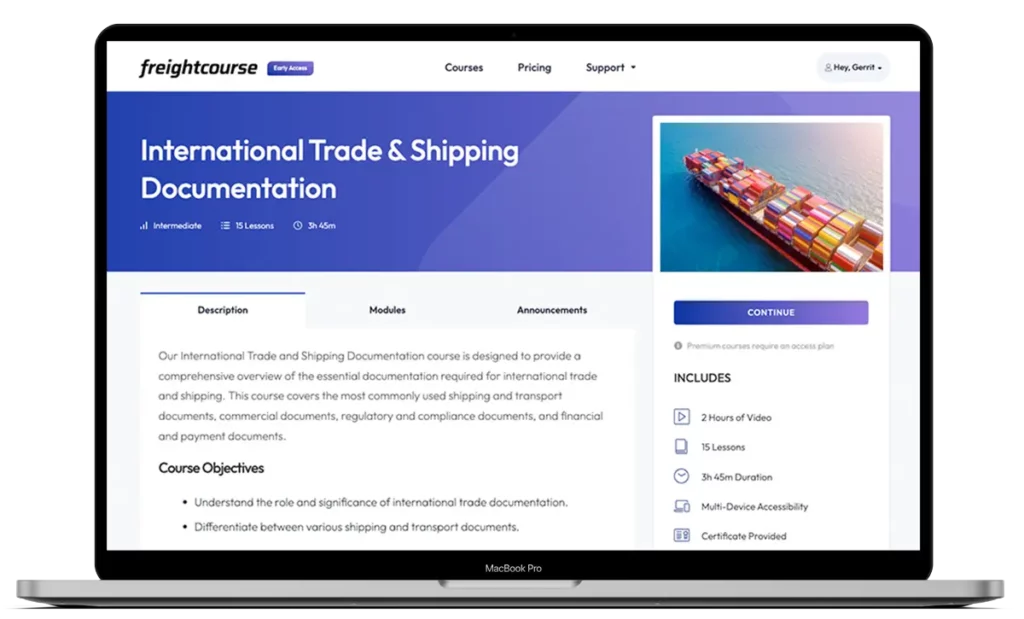A Freight Tonne-Kilometer (also referred to as Cargo Ton-Kilometer) is a unit of measurement used to calculate payload distance. It measures how much freight or cargo (in tonnes) is moved over a traveled distance (in kilometers).
In certain regions, namely the United States, Freight Ton-Miles are used instead of Freight Tonne-Kilometers but essentially calculate the same measurements. However, the output value is different as empirical units of measurement are used instead of metric units.
How to Calculate a Freight Tonne-Kilometer?
Calculating the Freight Tonne-Kilometer (FTM) yields a freight productivity value that indicates how many tonnes of freight has moved over a specified distance. Let’s take a closer look at the formula:
Total Freight Tonne-Kilometers = Total Distance (in kilometers) x Total Weight (in tonnes)
In order to calculate the total Freight Tonne-Kilometers, you need to take the total distance that the freight or cargo travels (in kilometers) and multiply it by its total weight (in tonnes).
Airlines often use tonne-kilometer calculations to measure airfreight productivity and utilization for various routes (using airport-to-airport distances). Moreover, the International Air Transport Association (IATA) also uses FTKs to calculate annual carrier statistics.
How to Calculate a Freight Ton-Mile?
Similar to the section above, calculating the Freight Ton-Mile (FTM) yields freight productivity as well, albeit using different units of measurement. As such, the formula for FTM is presented below:
Total Freight Ton-Miles = Total Distance (in miles) x Total Weight (in tons)
As mentioned above, this unit of measurement is typically used in the United States. It is important to note that because of the different units of measurement, the calculated total of FTM would differ from FTKs for the same freight transportation.
What Are FTKs and FTM Used For?
Various types of businesses use Freight Ton-Miles or Freight Tonne-Kilometers to calculate freight productivity and different types of analyses. For example, airlines often use FTKs & FTM calculations for aircraft, lanes, and regions.
While these measurements are often used in the airline industry, businesses representing other modes of transport also make use of them to make strategic decisions. Below are some key applications of these indicators:
- Productivity Indicators – FTKs and FTMs can be used to calculate the productivity of a vehicle (typically an aircraft, vessel, or truck), a lane, a region, or a business. These calculations are usually computed monthly, quarterly, and annually to spot market trends and make strategic decisions. There are also various organizations such as IATA and World Bank that use these calculations to publish annual statistics.
- Maintenance Scheduling – Wear and tear for equipment used in all freight sectors (namely. road, rail, air, and sea) are not solely dependent on distance or weight but rather both in combination. Therefore, FTKs and FTM allow technicians and maintenance teams to analyze and schedule the next maintenance.
- Cost Structure Analysis – Another practical use for FTKs and FTM is that they can be used to break down costs for services offered by businesses, one of the most challenging aspects in the service industry. By using this indicator, businesses can learn and develop pricing structures that are competitive for their clients while maintaining a healthy profit margin.
- Revenue Analysis – Similar to the cost structure analysis, businesses may use FTKs and FTM to verify their key segments, routes, and equipment that generates the best revenue against freight productivity. Each payload varies in its revenue, difficulty, distance, and weight among others, and these indicators help analysts simplify the equation to generate reports more accurately resulting in better decision-making.

Get Free Course Access
If you enjoyed the article, don’t miss out on our free supply chain courses that help you stay ahead in your industry.

Gerrit Poel
Co-Founder & Writer
at freightcourse
About the Author
Gerrit is a certified international supply chain management professional with 16 years of industry experience, having worked for one of the largest global freight forwarders.
As the co-founder of freightcourse, he’s committed to his passion for serving as a source of education and information on various supply chain topics.
Follow us